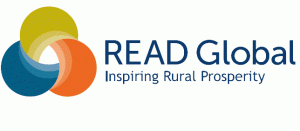READ Global
Every month, 5 million people flee the poverty of rural villages and head for the city to find work and to feed their families. The resulting urban overpopulation and squalor impacts all of us, through increased pollution and diminishing resources, the spread of disease, lack of clean water and safe food, and drained economic resources. These problems don’t know borders; they threaten the health of the global community and the strength of the global economy. Today we face a rural imperative: the urgent need to make rural villages places where families can thrive.
The READ Global Solution
The READ model partners for-profit business enterprises with non-profit Community Library and Resource Centers (READ Centers). This unique approach allows the local community to sustain the operations of the READ Center over the long-run while creating local jobs.
How READ Works
Enterprise: READ Global works with community members to seed for-profit business enterprises that meet local needs, provide job opportunities and generate sustaining revenues for the READ Center.
Education: READ Global works with communities to fund and build READ Centers that meet the unique needs of each village. These Centers provide access to books, computers, educational materials, job training, health services and workshops on leadership and conflict resolution. With these resources, individuals and families can learn, grow and reach their full potential.
Prosperity: With a strong emphasis on both education and enterprise, the READ Global solution brings communities together to share ideas and build relationships that enable families and children to stay and thrive in their own communities.
Key to READ’s Success
The READ model enhances rural capabilities, it does not replace them. We work closely and respectfully with local villagers to leverage their assets and talents to meet their specific educational, community, and employment needs. Villages contribute between 10-15% of the total cost of the project along with land and labor and READ makes up the rest. This local ownership of such a community solution is essential to long-term success.

